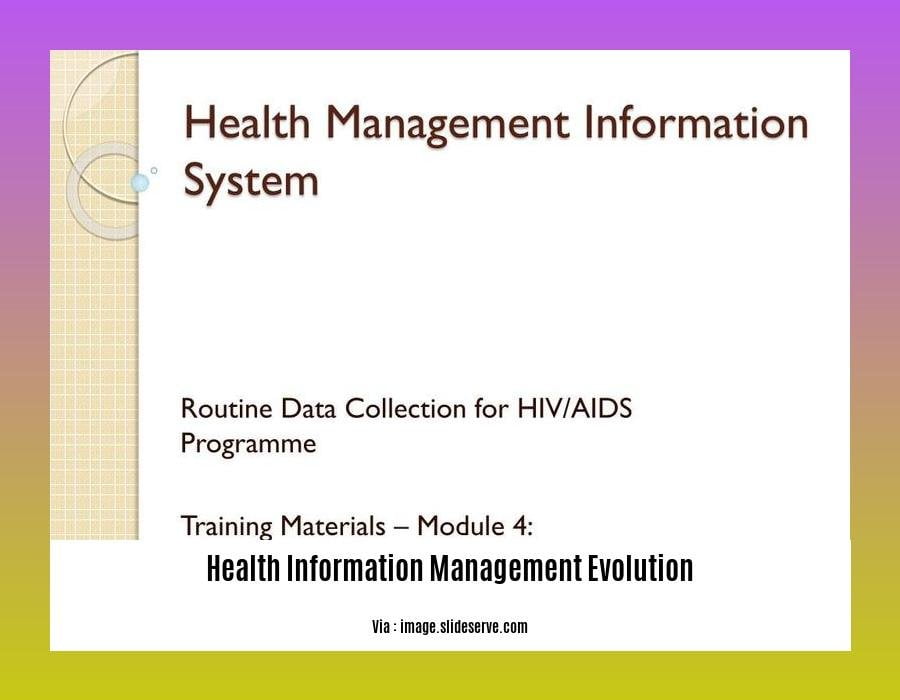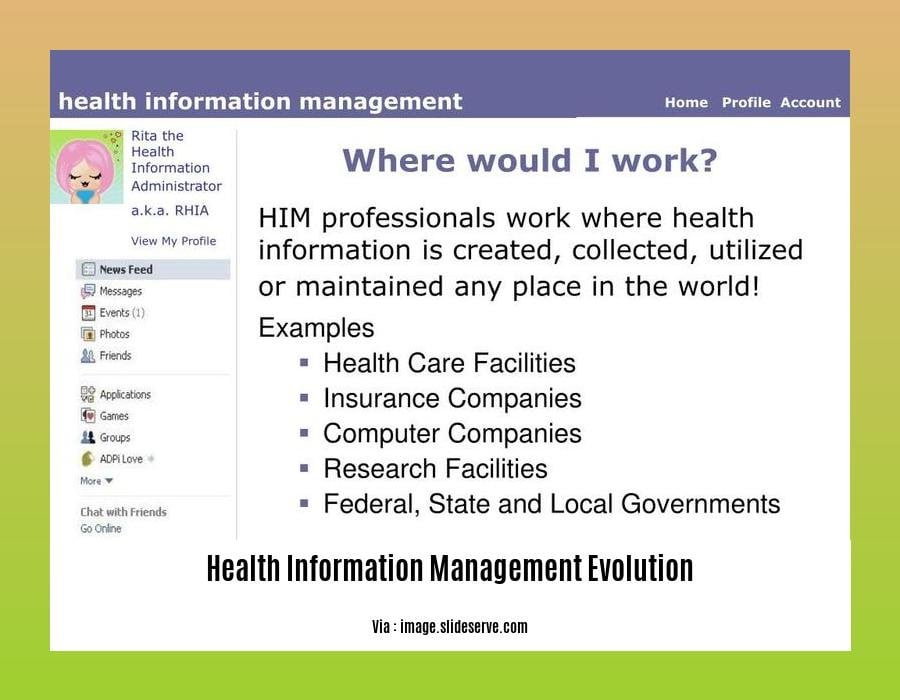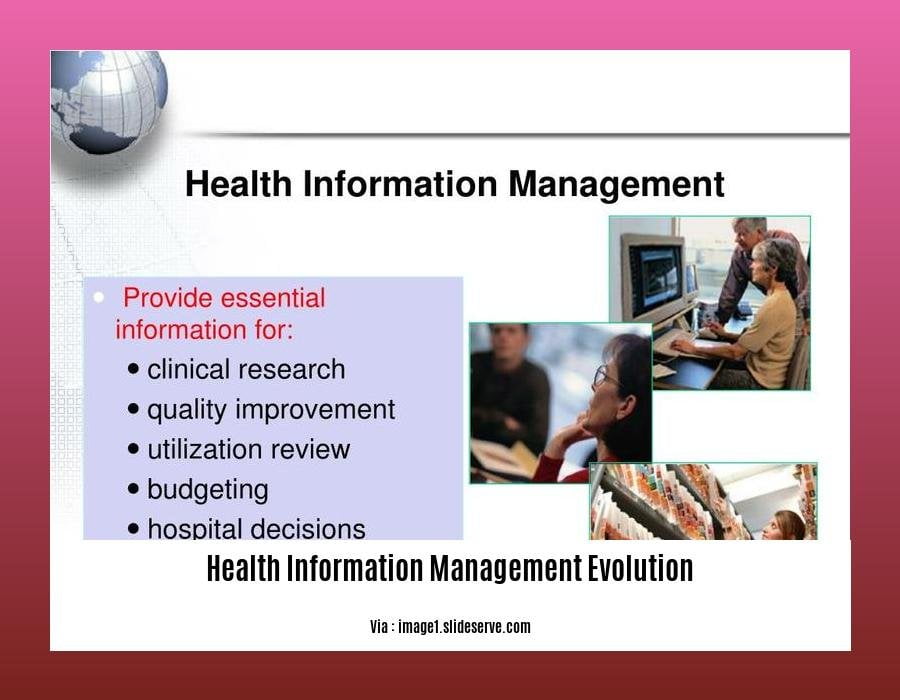Delve into the fascinating evolution of Health Information Management in the Digital Age. Witness the transformative impact of technology on healthcare data, empowering providers with seamless access to critical patient information. Explore the intricate world of EHRs, HIEs, and industry standards, and discover how they are revolutionizing the delivery of healthcare services and improving patient outcomes.
Key Takeaways:
- New roles have emerged in data analytics, privacy, risk, and change management, requiring a diverse skill set.
- Health information management professionals need knowledge in health systems, biomedical sciences, information technologies, and information management principles.
- Boundaries between activities, sources, and uses of health information are becoming less distinct.
- Health information management and health informatics are converging, with professionals playing a critical role in data management and analysis.
Health Information Management Evolution

In the dynamic healthcare landscape, health information management evolution holds great significance. Over time, the field has undergone significant advancements, transforming the way patient data is collected, stored, shared, and utilized.
Key Milestones in Health Information Management Evolution
- Standardized Medical Records: The establishment of uniform medical record formats ensured consistency and accuracy in patient data documentation.
- Electronic Health Records (EHRs): The advent of EHRs revolutionized record-keeping, providing instant access to patient information, reducing errors, and improving collaboration among healthcare providers.
- Health Information Exchanges (HIEs): HIEs facilitated the secure sharing of patient data across healthcare organizations, enhancing continuity of care and reducing duplication of tests.
- Big Data and AI in HIM: The rise of big data and AI has empowered HIM professionals to analyze vast amounts of patient data, identify patterns, and make informed decisions to improve patient outcomes.
Impact of Health Information Management Evolution
These advancements have had a profound impact on healthcare:
- Patient Care: Enhanced access to accurate and timely information has improved patient safety, reduced medical errors, and facilitated personalized care.
- Healthcare Operations: EHRs and HIEs have streamlined administrative processes, increased efficiency, and reduced costs.
- Research: Big data analytics and AI have enabled researchers to uncover new insights into disease patterns and develop innovative treatments.
Future Trajectories
The health information management evolution continues to advance rapidly, with emerging trends such as blockchain, interoperability, and remote patient monitoring shaping the future of healthcare. HIM professionals will play a pivotal role in adapting to these changes, ensuring the secure and effective management of patient data.
Skills and Qualifications for a Successful HIM Career
A successful HIM career requires a diverse skill set that includes:
- Understanding of health systems and biomedical sciences
- Proficiency in information technologies and management principles
- Data analysis and interpretation skills
- Knowledge of privacy and security regulations
- Excellent communication and interpersonal skills
Learn more about the evolution of medical record keeping by reading the history of health information management. From ancient practices to modern technologies, discover the fascinating journey of HIM history and its impact on healthcare today. Additionally, you can also explore the history of medical records management to understand the significance of accurate and efficient record-keeping practices in healthcare organizations.
Benefits and challenges of HIM advancements

The digital age has brought about a wave of advancements in health information management (HIM), transforming the way healthcare data is collected, stored, and utilized. These advancements have brought forth numerous benefits, but also presented challenges that HIM professionals must navigate.
Benefits:
- Improved patient care: Instant access to patient records enhances care coordination, reduces medical errors, and facilitates personalized treatment plans.
- Increased efficiency: EHRs and HIEs streamline administrative tasks, automate workflows, and improve data accuracy, resulting in time and cost savings.
- Enhanced research capabilities: Big data analytics and AI empower HIM professionals to uncover patterns and trends in patient data, leading to breakthroughs in disease diagnosis and treatment.
Challenges:
- Data security and privacy: The digitalization of health records raises concerns about data breaches and unauthorized access, requiring robust cybersecurity measures.
- Interoperability challenges: Ensuring seamless data exchange between different healthcare systems remains a hurdle, hindering the full potential of HIEs.
- Skill gaps: The rapid evolution of HIM demands professionals with specialized knowledge in data analysis, informatics, and information governance.
Addressing these challenges is crucial to fully harness the benefits of HIM advancements. By investing in cybersecurity, promoting interoperability, and fostering HIM education and training, healthcare organizations can empower HIM professionals to drive innovation and improve patient outcomes.
Key Takeaways:
- HIM advancements have revolutionized patient care, increasing efficiency, and enhancing research capabilities.
- Data security, interoperability, and skill gaps present challenges that need to be addressed.
- Investing in cybersecurity, promoting interoperability, and fostering HIM education is essential for optimizing HIM advancements.
Most Relevant URL Source:
Health Information Management: Implications of Artificial Intelligence
Impact of HIM on Healthcare
HIM has significantly impacted healthcare, transforming patient care, operations, and research. Here’s how:
Improved Patient Care
- Enhanced accuracy and timeliness of medical records reduces errors and improves treatment outcomes.
- More informed decision-making due to real-time access to patient data.
- Improved care coordination among healthcare providers through secure data sharing.
Streamlined Healthcare Operations
- Reduced administrative tasks through electronic record-keeping and automation.
- Efficient data management leads to lower operating costs.
- Improved interoperability allows seamless data exchange across systems.
Advancements in Research
- Access to vast datasets supports medical research and innovation.
- Data analysis aids in discovering new insights and patterns.
- Enables development of personalized treatments based on individual patient data.
Key Takeaways:
– HIM improves patient safety and treatment outcomes.
– It enhances healthcare operational efficiency and cost-effectiveness.
– HIM drives advancements in medical research and personalized medicine.
Future of HIM and role of HIM professionals
The Future of HIM and role of HIM professionals is on the rise. As technology advances, the healthcare industry is constantly evolving. This evolution has led to a greater need for health information management (HIM) professionals. HIM professionals are responsible for managing and protecting patient health information. They work to ensure that patient information is accurate, complete, and secure.
HIM professionals play a vital role in the healthcare industry. They help to improve patient care by ensuring that healthcare providers have access to the information they need to make informed decisions. They also help to protect patient privacy by ensuring that patient information is kept confidential.
The demand for HIM professionals is expected to continue to grow in the years to come. As the healthcare industry continues to evolve, HIM professionals will be needed to manage and protect the growing amount of patient health information.
Key Takeaways:
- HIM professionals are responsible for managing and protecting patient health information.
- HIM professionals play a vital role in the healthcare industry.
- The demand for HIM professionals is expected to continue to grow in the years to come.
Most Relevant URL Source
FAQ
Q1: How has Health Information Management (HIM) evolved in the digital age?
A1: HIM has evolved significantly, leveraging electronic health records (EHRs), health information exchanges (HIEs), and advanced analytics to enhance patient care, reduce costs, and improve research and innovation.
Q2: What are the key challenges facing HIM professionals in the digital age?
A2: HIM professionals face challenges related to data security and privacy, interoperability, and keeping up with rapidly evolving technologies and regulations.
Q3: How is Artificial Intelligence (AI) transforming HIM practices?
A3: AI is automating tasks, improving data analysis, and enhancing decision-making in HIM, leading to more efficient and personalized healthcare delivery.
Q4: What are the emerging roles and responsibilities of HIM professionals?
A4: HIM roles are expanding to include big data analysis, statistical modeling, project management, and clinical documentation integrity, supporting various aspects of healthcare operations.
Q5: How can HIM contribute to improving patient outcomes and reducing healthcare costs?
A5: Effective HIM practices can ensure accurate and timely access to patient data, facilitate collaboration among healthcare teams, reduce errors and duplication, and enable personalized treatment plans, ultimately leading to better patient care and lower healthcare expenses.
- Unveiling the Enigma: Mansoureh Khojasteh Bagherzadeh’s Public Appearances & Private Life in Iran - July 18, 2025
- Unveiling the Mystery: Mansoureh Khojasteh Bagherzadeh’s Husband: A Rare Glimpse into a Private Life - July 18, 2025
- Unveiling Masoud Khamenei’s Mother: Power, Influence, and Iran’s Future - July 18, 2025


![[History of EMS Timeline]: A Journey from Humble Beginnings to Sophisticated Healthcare history-of-ems-timeline_2](https://www.lolaapp.com/wp-content/uploads/2023/12/history-of-ems-timeline_2-150x150.jpg)













